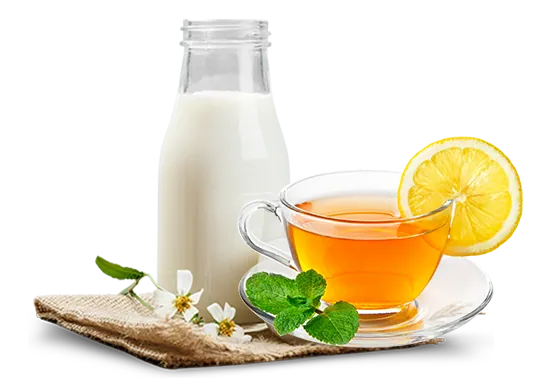- Health Benefits of Milk Tea
- Understand the Benefits and drawbacks
- List of Potential Health Benefits


Undoubtedly, tea is India's national drink, affectionately known among Indian households as Chai. Typically, Indians' day begins with a cup of hot milk tea, followed by extra cups throughout the day from roadside tea vendors and canteens. However, tea is quite a well-known beverage that has been consumed since the 3rd century AD.
Overall, 64% of the total population in India is the tea-drinking population. Indeed, the health benefits associated with drinking tea are pretty outstanding. Based on the studies, drinking 2-3 cups of tea regularly may prevent heart disease and reduce the risk of premature death and type 2 diabetes.
Unlike the British cup of tea, tea is commonly consumed with milk in India. But it's imprecise whether missing milk with tea provides additional health benefits or health drawbacks. Let's take a more in-depth look at the potential benefits of consuming milk tea.
When it comes to Indian tea blends, you'll easily find some of the finest of the lot. However, consuming milk tea has its own benefits and drawbacks.
Studies indicate that milk can reduce the beneficial impact of tea because milk is rich in proteins that may lessen the effectiveness of antioxidants in tea. Antioxidants can enhance your heart health, slow ageing, and keep your gut healthy.
Based on expert research, milk tea has a few benefits. It helps the body counteract the tannin's astringent and adds extra calories or nutrients. If you don't want to compromise with flavour, then you may consider drinking milk tea because milk can level up the flavours in tea.
As we know, drinking tea is considered a healthy habit that may improve overall health. While several sorts of tea promote health benefits, studies indicate that green and black teas are the most beneficial.
However, both black and green tea are made from the same plant leaves (Camellia sinesis) but undergo different processing methods. Both teas are highly rich in flavonoid content. These compounds work as an antioxidant to help combat implicit cell damage caused by free radicals. If your body has a high level of free radicals, it may lead to heart disease, cancer, and other chronic issues.
Generally, green teas contain a rich amount of flavonoids called catechins, while black teas contain a rich amount of theaflavins. Based on these two compounds, consuming both teas has been associated with regulating blood pressure, reducing bad cholesterol levels, and anticancer effects.
Tea, especially green and black varieties, contains a rich amount of antioxidant compounds that may enhance heart health and exert anticancer effects. Meanwhile, milk comes with beneficial nutrients that contribute to growth and strengthen bone health.
Due to the phytochemicals included in tea, drinking it has been line robust bones and a lower risk of developing arthritis. Tea contains flavonoids that help maintain bone density: a dash of milk increases this advantage. Milk is an excellent source of absorbable calcium, increasing bone density and lowering the chance of breaking bones. Additionally, it contains vitamin D, which promotes the body's improved absorption of calcium, which is essential for preventing issues with the bones.
It has been demonstrated that drinking milk tea has a stress-relieving effect. A cup of milk tea can effectively improve your mood while lowering your stress level, as stress and anxiety have become commonplace in modern life. L-theanine, a substance found in both green and black tea, may be to blame for this. Increasing alpha brainwave activity, which takes place during daydreaming, meditation, and mindfulness practice, promotes relaxation and improved attention.
Drinking milk tea has also been linked to maintaining a healthy weight. It functions both as a weight gainer and a weight-loser. Milk tea's milk fat content can promote weight gain. Catechins, a type of flavonoid found in tea, may help people lose weight by speeding up the body's fate-breakdown processes and raising metabolic rates. Additionally, the caffeine in many teas increases your energy levels, which raises your metabolic rate, and as a result, the calories you burn.
Free radicals produced by excessive sun exposure, stress, and a poor diet can prematurely age the skin. Milk tea's anti-inflammatory and antioxidant benefits may help slow the ageing process and lessen the visibility of scars, fine lines, and other skin flaws, Tea prevents the ageing of the skin by scavenging free radicals. Alpha hydroxy acid (AHA) lactic acid, found in milk, effectively cleans pores and removes bacteria that accumulate on the skin's surface and cause acne. This results in skin that is radiant and healthy.
Tea is one of the ancient and worldwide popular beverages, and drinking a cup of tea daily provides various health benefits. When it comes to whether consuming milk tea is beneficial or not, milk tea has its own benefits and drawbacks. But to relish the golden cup of hot tea with a blend of milk is the perfect cup of milk tea.
Milk tea contains antioxidant compounds that may enhance heart health, exert anticancer effects, and relieve stress.
Chai is a staple beverage in India associated with several health benefits, such as regulating blood sugar levels, aiding digestion, and helping with weight loss.
Some drawbacks associated with drinking milk tea include an increased risk of anaemia, which may lead to type 2 diabetes, and promote weight gain.
Based on the recipe or spices used and how the tea is brewed, chai tea can provide various noteworthy health benefits.
Doctors recommend the right age to start drinking tea is 12 years old.
Based on the studies, drinking 2-3 cups of tea regularly is safe.
If you're diabetic, you may want to avoid milk-based teas.
Drinking tea is beneficial for students, making studying easier for extended periods.
4.4
Rated by 2629 customers
Select Your Rating
Let us know about your experience or any feedback that might help us serve you better in future.


A boy-in-squares bagging escapades of switching streets in groove & sensing musical airy-notes from 6 1". Under wayed nyctophile sketching the walls of life from the panorama of anime.
Do you have any thoughts you’d like to share?